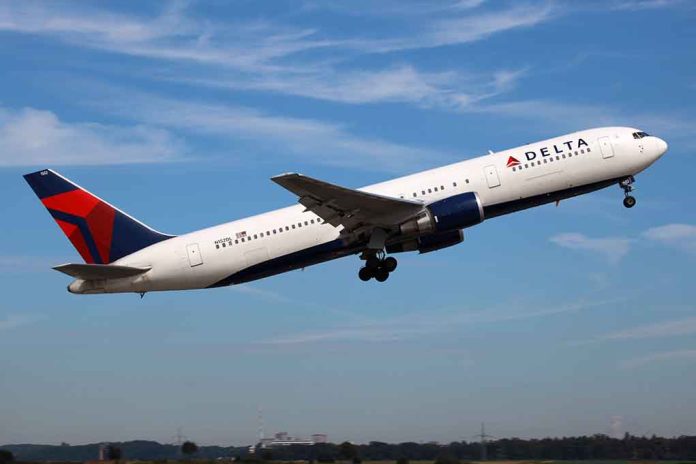
Emirates Airline President Tim Clark has finally had enough excuses from Boeing and Airbus as ongoing supply chain issues threaten to derail the aviation industry’s post-pandemic recovery.
Key Takeaways
- Emirates President Tim Clark sees positive progress at Boeing despite ongoing supply chain challenges affecting both major aircraft manufacturers.
- Boeing’s new leadership is working to stabilize production after last year’s quality crisis and labor strike halted most aircraft manufacturing.
- Emirates is still facing a six-year delay on its 205 Boeing 777X aircraft order, with deliveries now expected between late 2026 and early 2027.
- Clark harshly criticized aerospace manufacturers, telling them to stop using the pandemic as an excuse and take responsibility for supply chain issues.
- The Emirates executive expressed ongoing skepticism about Rolls-Royce engine performance in extreme desert climates, potentially affecting future orders.
Boeing Shows Signs of Recovery Under New Leadership
After years of production delays and quality control issues, Boeing appears to be turning a corner under its new leadership team. Emirates Airline President Tim Clark, who has been vocal about his frustrations with aircraft manufacturers, now acknowledges positive developments at the American aerospace giant. Despite facing a six-year delay on its massive 777X order, Emirates sees promising signs in Boeing’s renewed focus on stabilizing production and addressing systemic problems that have plagued the company since the 737 MAX crisis and subsequent pandemic disruptions.
“We’re seeing a more positive tone,” said Tim Clark
The Dubai-based carrier has 205 Boeing 777X aircraft on order, representing a significant portion of its future fleet strategy. Originally scheduled for delivery years ago, these fuel-efficient wide-body jets are now expected between late 2026 and early 2027, pending FAA certification. The delays have forced Emirates to continue operating older, less efficient aircraft longer than planned, impacting both operating costs and the airline’s environmental footprint at a time when fuel efficiency has become increasingly important.
No More Pandemic Excuses
Clark’s comments weren’t all positive, as he delivered a blistering critique of the aerospace industry’s continued reliance on pandemic-related excuses for ongoing supply chain issues. His frustration reflects a growing sentiment among airline executives who believe manufacturers have had sufficient time to resolve supply chain disruptions that began during COVID-19. The Emirates president specifically called out both Boeing and Airbus for failing to take full responsibility for their production challenges.
“I’m quite tired of the self-pity about the supply chain—you are the supply chain,” According to the President of Emirates Airline.
This unfiltered criticism highlights the growing tension between airlines and manufacturers as delivery delays continue to impact fleet renewal plans worldwide. While Boeing has faced the most public scrutiny following its quality control issues and factory floor problems, Clark noted that Airbus isn’t faring much better, with potential supply chain delays stretching up to three more years. This situation puts additional pressure on airlines already struggling to meet post-pandemic travel demand with aging fleets.
Engine Concerns and Trump’s Tariffs
Beyond the aircraft manufacturers themselves, Clark also expressed ongoing skepticism about Rolls-Royce engine performance in extreme desert conditions. Emirates operates in one of the world’s most challenging environments for aircraft engines, with high temperatures and sand exposure creating unique maintenance challenges. These concerns could impact potential deals for Rolls-powered Airbus A350-1000 jets that might otherwise be showcased at the upcoming Dubai Airshow.
“There are still opportunities for Rolls-Royce in the region—if they can deliver the performance we need,” said Tim Clark
Interestingly, Clark indicated that President Trump’s tariff policies haven’t affected Emirates’ demand or planning. He expects engine supplier GE Aerospace to absorb any tariff impacts rather than passing them along to customers like Emirates. This pragmatic approach reflects the airline’s strategic position and bargaining power as one of the world’s largest international carriers with billions in outstanding aircraft orders that manufacturers desperately need to secure.
The Path Forward
As both Boeing and Airbus struggle to ramp up production, airlines like Emirates face difficult decisions about fleet planning and route expansion. The delays affect not just aircraft deliveries but broader industry growth at a time when air travel has rebounded strongly from pandemic lows. Boeing’s renewed focus on stabilizing production before attempting to increase output suggests a more realistic approach under its new leadership, but challenges remain significant after years of disruption.
Emirates, meanwhile, continues to demand concrete solutions and accountability from its suppliers. With its massive Boeing 777X order hanging in the balance and potential Airbus orders being considered, Clark’s blunt assessment serves as both warning and motivation for manufacturers to resolve their production issues. For conservative airline industry observers, this situation highlights how government-mandated pandemic shutdowns continue to ripple through global supply chains years later, despite the Biden administration’s claims of a strong economic recovery.




